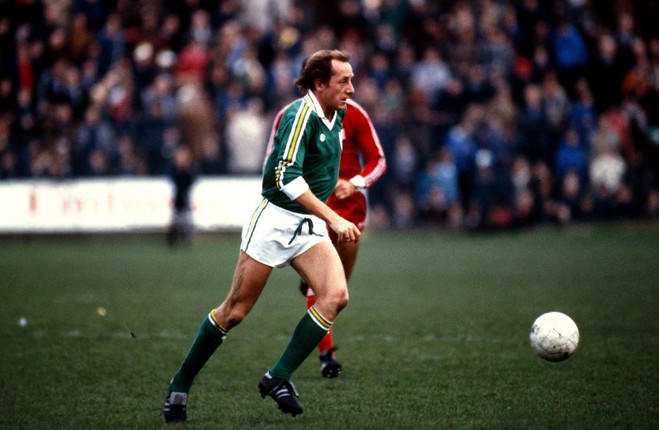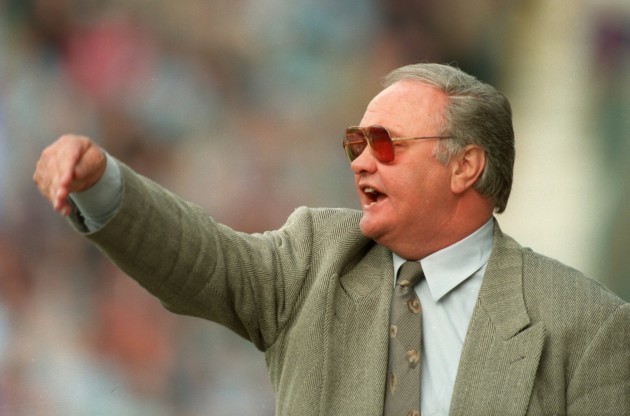IT’S 40 YEARS since Ireland last beat Denmark in a competitive fixture.
It was a Euro 1980 qualifier at Lansdowne Road, John Giles was manager of the team, while Gerry Daly and Don Givens got the goals in a 2-0 win.
Ireland have played Denmark 11 times since then (nine of which have been competitive), losing twice under Eoin Hand, drawing twice under Jack Charlton, winning a friendly apiece under Mick McCarthy (in his first spell) and Steve Staunton, drawing three and losing one under Martin O’Neill, and drawing most recently under McCarthy.
The current side will aim to buck that worrisome trend when the countries meet again in Monday’s crucial Euro 2020 qualifier.
Following that last significant victory, Ireland still only finished third in their group ahead of Bulgaria and the Danes, but behind Northern Ireland and England, who took the sole qualifying spot and were one of eight sides to compete in the subsequent tournament.
Mick Martin was part of the side that day, having only recently returned from international exile. He had been banned for nearly two years from competitive fixtures due to his involvement in the infamous ‘Bulgaria Brawl’ in 1977.
A previous sending off in 1975 against Turkey also worked against him, when Fifa and Uefa decided on this rather harsh verdict, which Martin believes ultimately prevented him from becoming Ireland’s record caps holder at the time.
“It was just unfortunate for me,” he tells The42. “I had been sent off in that game, and prior to that, I had been sent off in Dublin, against Turkey, for the reaction to one of their players who spat at me.
“I went and I slapped him. I didn’t punch him or push him. That was the end of a European qualifying campaign and that was probably the start of a World Cup campaign against Bulgaria.
“When I was sent off, it could have been any of two players, but it was me and Noel Campbell. But they could have picked two from any, because we were all involved in it.
It was very unlike me — I wasn’t like that. They suspended me for a year and a half, probably when I was in the prime of my playing career, mid-to-late 70s.”
Martin would win 51 caps overall, emulating his father Con who enjoyed successful footballing stints on both sides of the water and was a rare instance of a player who represented both Ireland teams, the FAI XI and the IFA XI, winning 36 caps in total.
Mick’s brother, also named Con, is a former League of Ireland player, while his nephew Owen Garvan is an ex-Ireland U21 international whose former clubs include Crystal Palace and St Patrick’s Athletic.
Mick himself started out in the League of Ireland with Bohemians. His first appearance at international level in 1971 was as part of a team almost exclusively made up of domestic-based players, after English clubs refused to release their stars to new Ireland boss Liam Tuohy. They were subsequently trounced 6-0 by Austria in Linz.
I wasn’t unduly worried about that [result],” Martin recalls. “I realised the players they had were far more experienced than the players we had. We were a semi-pro team at the time of mostly League of Ireland players. It appealed to me more because my father was an Irish international footballer and the fact that I had been selected to play for the first international not knowing that another 10 years lay ahead — it would have sufficed having done what my dad did.”
Martin never qualified for a major tournament with Ireland, but he was involved in a couple of near misses, most notably Ireland’s 1-0 loss to Belgium that featured a number of contentious refereeing decisions in a match where a draw would have been enough to see Eoin Hand’s side through to the 1982 World Cup.
“We were very close to qualifying for the European and World Cup tournaments on numerous occasions. We got done by a point and then got done by goal difference. It was very disappointing, because the one thing I wanted to do was play in the final of a European Championships or World Cup.
“All those games we played against France, Spain, Poland, Holland, all huge games in front of 40,000 or 50,000 people. But the one that sticks out in my mind is a friendly against Brazil in the Maracanã Stadium in 1974. And we got beaten 2-1. But that’s because there were 90,000 people watching the game. Playing in the Maracanã is a big experience for great players. I’m pleased to say that I had the opportunity to do it once.”
He continues: “We had great players and the team we had would stuff the [Ireland] team they’ve got now. We had far better players at the time.
“It was hard to qualify then. When you’re not classed as one of the top teams in your group, you know you’re going to play against two top teams.”
*******
The story of how Martin got started at club level in English football is also quite something. Tommy Docherty and Matt Busby came over to Tolka Park for a Bohemians-Shelbourne game with a view to watching Gerry Daly, who went on to sign for Man United and make over 100 appearances for the Red Devils. But they were similarly impressed with Martin.
“On the Monday morning, my dad said: ‘You might want to get up out of bed.’ I worked in the shopping centre out in Stillorgan – Kenny’s sports shop. Monday was off for me, because I worked on Saturdays in that industry. He said: ‘Manchester United want to speak to you, they’re interested in signing you.’ I said: ‘Do us a favour dad, I’m tired, I had a late night last night.’ He said: ‘No, get yourself ready, we’ll go down to the Gresham Hotel.’ We met with Matt Busby, Tommy Docherty. On Tuesday morning, I was on a flight to Manchester with the da, on the Tuesday afternoon I signed a two-year contract with Manchester United and the rest is history.
“That started it all. From working in the sports shop to, on the following Tuesday, sitting beside Bobby Charlton, Dennis Law and players like that was kind of strange.
I got on very well with Bob to a degree. When he finished playing, he wanted to sign me at Preston North End when he was the manager there, but I went to West Brom instead. But it was only [the first year] I played with Bob, because he retired at the end of the season.”
Martin joined the Red Devils for £30,000 — a record fee for a League of Ireland player at the time. He went pretty much straight into the starting XI, making his debut on 24 January 1973 in front of 50,000 fans amid a 0-0 draw with Everton at Old Trafford.
It was not a vintage Man United team. Despite having won the European Cup less than five years previously, many of their top players were past their prime and a rebuilding process was underway.
In Martin’s first season, he scored crucial goals in 1-0 wins over Newcastle and Norwich respectively, victories that helped United avoid relegation, as they came 18th out of 22 teams, and seven points above the drop zone.
It wasn’t a bad United side,” he says. “It’s just that things weren’t kicking for them. Tommy Docherty was in the process of changing all the playing staff and bringing in a variety of players and letting all those who won the European Cup for them go. They were getting past their 30s. So they were trying to get in a variety of young players. The same week I signed, Lou Macari, Jim Holton, Alex Forsyth and George Graham signed. So you had five players there, four of whom were under 24 and the other, George, was sort of late 20s, early 30s. So it was a transition period.”
And with the current United team struggling to meet great expectations too, does Martin see many parallels with the side in which he played?
“There probably is, yeah. Ole Gunnar Solskjaer is trying his best to get things right, experiment, see who’s good where and what happens. So it’s not guaranteed that you’re going to win a championship every year because you’re Manchester United. You’ve got to work hard at it and the manager’s got to make sure you’ve got the right players to do the right jobs, because that’s the way it works.”
Martin was left out of the side for much of the following season. Despite regaining his place late on in the campaign, he couldn’t prevent the Red Devils from suffering the ignominy of relegation, an experience he describes as “a shock”.
The club regained promotion comfortably at the first attempt, before John Giles, who was also player-manager of Ireland at the time, brought the midfielder to West Brom, where Martin would enjoy the best spell of his career, helping them win promotion and finish as high as seventh and sixth in their first two seasons back in the top flight.
“I had a good time there. In actual fact, I’m going down there tomorrow with Johnny Giles and a couple of other colleagues at a dinner on Friday to be a guest speaker, so I’m looking forward to that. They’re a good club with good players, fairly ambitious, played 90 odd games for them, scored something like 30 odd goals and it was a very good period in my football career.”
Giles’ successor, Atkinson, sold Martin to Newcastle for £100,000 in 1978.
West Brom was the best period. Newcastle was a big challenge. They made me captain and I thoroughly enjoyed that. They weren’t as ambitious as other clubs, they weren’t prepared to go out and spend money and attract players in the North East of England and that’s the reason they struggled at the time and even after that, they struggled. When they did get players who were good, the likes of Chris Waddle and Paul Gascoigne, they capitalised on their value and sold them pretty quickly rather than try to keep them and for them to attract players to the club. But that’s always been the case at Newcastle.”
Since retiring in 1987, Martin has stayed involved in football, while also trying his hand at other activities, including opening a bookmakers and sports shop called ‘Zico,’ after his nickname as a player. He also worked for a few years as a coach with both Newcastle and Celtic, the latter during Liam Brady’s short-lived spell as manager of the Parkhead outfit in the early ’90s. He did commentary for the local radio station in Newcastle, Metro FM, for a number of years, while he also worked as an FAI scout starting in conjunction with the Giovanni Trapattoni era, before being let go as part of the restructuring process last January.
Now 68, Martin can reflect on a lifetime in football that began in the League of Ireland and really took off during that fateful day when his father got him out of bed prematurely.
“Just listen to people who know more about football than you do,” he adds. “Take in all the good stuff you hear and throw all the other stuff that you think is not really appropriate out the door. Dedication and hard work gets you to where you can be, that’s all you can hope for. If someone likes what they see, you’ve got a chance then.”
The42 is on Instagram! Tap the button below on your phone to follow us!


